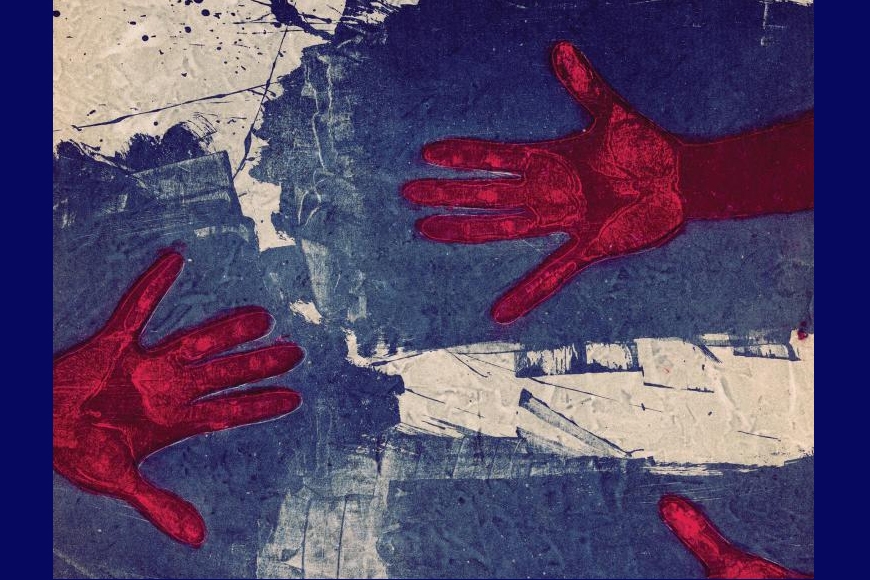New Pages
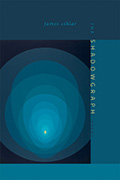
New from English faculty
Senior Lecturer James Cihlar
The Shadowgraph [poetry]
University of New Mexico Press, 2020
From the publisher: "In The Shadowgraph James Cihlar explores the ways images, performances, and memories shape and inform LGBTQ+ identity. Golden-age Hollywood cinema—in particular the career of fiercely independent actress Barbara Stanwyck—provides the screen on which Cihlar projects characters and stories bravely, even defiantly, performed. Cihlar’s commentary on individual films—as well as on human experience and desire—is intense, smart, and right on target."
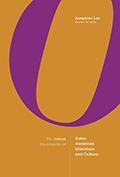
Professor Josephine Lee, editor
Oxford Encyclopedia of Asian American Literature and Culture
Oxford University Press, 2020
From the publisher: "This project offers the largest and most comprehensive collection of scholarship on Asian American literature and culture to date. With original essays on everything from Asian American literary classics to experimental theater, from K-pop to online gaming, the encyclopedia guides both established scholars and readers new to this study through the extensive landscape of Asian American writing and cultural production. More than 100 essays on varied historical periods, geographical contexts, and artistic modes offer an extensive examination of racial representation and activism, interdisciplinary and comparative approaches to literary work, ethnic communities, transnational and transpacific flows, and genres such as speculative fiction, the detective novel, and melodrama. . . . The collection surveys the historical foundations of this rich field, showing the exciting and profound new directions that currently drive the study of Asian American literary and cultural traditions."
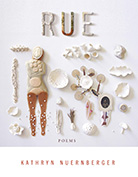
Assistant Professor Kathryn Nuernberger
Rue [poetry]
BOA Editions, 2020
From The St. Louis Post-Dispatch: "Kathryn Nuernberger’s dazzlingly imaginative third collection is in part an examination of plants with medicinal properties, specifically as birth control. It is also, though, a testament to the generations of women who carried this knowledge on, whose names are lost and whose 'witchy' wisdom the poems resurrect. The poems are filled with the fantastic but grounded in the middle of a modern woman’s life, when desire and regret threaten to upend everything we have been told to want. Her work is frequently hilarious (in the poem 'Pissy Bitch Middle-Aged Happy,' the speaker confesses: 'If you asked, I’d describe myself/as looking a bit like a pissed-off possum'), yet it is just as often intoxicatingly ruthless in its truth-telling. . . . Nuernberger turns the confessional mode inside-out—the revelation of the personal becomes an indictment of a culture that seeks to alienate women from their own bodies, fearing the power of women who own their age, their sexuality and their fierce determination to become their fullest selves."
New from English alums
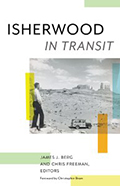
James J. Berg (PhD 1996), co-editor
Isherwood in Transit
University of Minnesota Press, 2020
From the publisher: "'Perhaps I had traveled too much, left my heart in too many places,' muses the narrator of Christopher Isherwood's novel Prater Violet (1945), which he wrote in his adopted home of Los Angeles after years of dislocation and desperation. Isherwood in Transit considers the writer not as an English, continental, or American writer but as a transnational one, whose identity, politics, and beliefs were constantly transformed by global connections and engagements arising from journeys to Germany, Japan, China, and Argentina; his migration to the United States; and his conversion to Vedanta Hinduism in the 1940s. Approaching Isherwood's rootlessness and restlessness from various perspectives, these essays [including one by Professor Emerita Lois Cucullu] show that long after he made a new home in California and became an American citizen, Christopher Isherwood remained unsettled, although his wanderings became spiritual and personal rather than geographic."
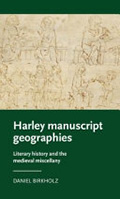
Daniel Birkholz (PhD 1999)
Harley Manuscript Geographies: Literary History and the Medieval Miscellany
Manchester University Press, 2020
From the publisher: "The Harley manuscript was produced upon England's Welsh March, by a scribe whose generation died in the Black Death. It contains a diverse set of writings: love-lyrics and devotional literature, political songs and fabliaux, saints' lives, courtesy texts, Bible stories and travelogues. . . . The introduction explores how this fragmentary miscellany keeps being sutured into 'whole'-ness by commentary upon it. Individual chapters examine different genres and social groupings and demonstrate that there are many Harley landscapes still waiting to be discovered."
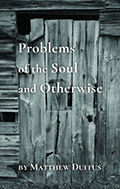
Matthew Duffus (MFA 2005)
Problems of the Soul and Otherwise [poetry chapbook]
Finishing Line Press, 2020
From Edward Byrne, editor of Valparaiso Poetry Review: "In deeply resonant poetry, Matthew Duffus continually creates an awareness of the contrast between an absence—of youth, music, Arctic ice, luck, faith, and those we loved—and a presence—of mind, hope, wisdom, pleasant memories, and those we love. . . . He wonders about the ability to 'weigh Sunday errands with / the inconvenience of Salvation.' Thus, Duffus reminds readers to seek a needed sense of balance that comforts us when conditions seem chaotic or disconsolate, that blends lessons learned in the past with behavior practiced in the present, and that admirably offers enough courage each day to 'begin all over again.'"

M. J. Gette (MFA 2017)
Majority Reef [poetry]
Inside the Castle, 2020
From the publisher: "In Majority Reef, there are 8 SURFACES. Eight surfaces can form an octahedron, which looks like two triangular prisms put together at their bases, which forms the interior of a sphere, such as the globe. Within each section is a lyric essayistic syntax of 'recursive loops of longing' or an 'infinite palimpsest of pain or desire,' a variety of 8 tones—or perhaps a doubling of the 4 humors—that loop in a style I am calling Weeping Lemon Meringue, or echo-poetics, the ant-I-narcissus."
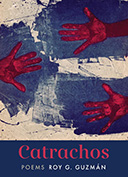
Roy Guzmán (MFA 2017)
Catrachos [poetry]
Graywolf Press, 2020
From O, The Oprah Magazine: "Who more than queer people—especially queer people of color—know what it’s like to dance in the face of danger, to sashay away in the face of extinction, to love in the face of stolen liberties? Guzman’s vivacious collection of verse—including a poem cycle called 'Queerodactyl,' in which dinosaurs celebrate their fabulousness as annihilation dawns, and a devastating elegy for the Pulse nightclub victims—announces, like a meteor barreling across the sky, the emergence of a powerful new force."
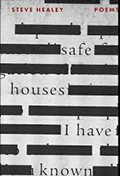
Steve Healey (PhD 2009)
Safe Houses I Have Known [poetry]
Coffee House Press, 2019
Finalist for the Minnesota Book Award in Poetry
From Shelf Awareness: "In his third poetry collection, Healey (10 Mississippi) lays bare his silent turmoil as his father reveals his identity as a spy for the CIA and as his parents' marriage unravels. Healey evokes a sense of spiraling through variations on the villanelle and descriptions of 'going around and around.' In tandem with this dizziness is the overarching idea of the watcher and the watched, with one haiku asking, 'Can you see the eyes that see/ you through swirling snowflakes?' The reader is again implicated in 'Self-Surveillance': 'You press the shutter button / and fall for the first time. You get up / and continue.' Mirrors, binoculars, windows, and eyes enhance this atmosphere of exposure, making an early poem's question 'What does the word 'safe' mean to you?' haunt. Through clever wordplay, Safe Houses I Have Known aptly conjures the terror of a world where everyone watches everyone."
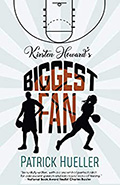
Patrick Hueller (MFA 2010)
Kirsten Howard's Biggest Fan [middle grade fiction]
INtense Publications LLC, 2020
From the publisher: "Michael Duncan has everything going for him: a growth spurt, a best friend who’s even more sports-obsessed than he is, and a (mutual?) crush on Kirsten Howard, the best basketball player in the state. But then he gets injured, and his friend gets crazy. All of the sudden, Mike’s life isn’t looking so great, and that’s before the scandal that implicates both Kirsten and her coach, aka Mike’s father."
From author Geoff Herbach: "Hueller has written a powerful story about family trauma and deep friendship that sings with a love of sport and hope. What a joy to read."
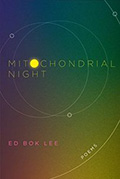
Ed Bok Lee (BA 1994)
Mitochondrial Night [poetry]
Coffee House Press, 2019
Finalist for the Minnesota Book Award in Poetry
From Los Angeles Review of Books: "How might it affect me, or you, if our grandparents fled war or famine, or had their passports invalidated overnight? Is the terror of statelessness a genetically inheritable trait? Ed Bok Lee takes a scientific departure point (mitochondria, the accrual of matrilineal DNA) and provocatively combines it with trauma theory in an attempt to answer these questions. The trauma in question arises from Lee being the son of two or more Koreas. His mother is a refugee from North Korea and his father was raised in the South under the Japanese colonial rule. . . . In 'Ode to the poems of any small nation,' he imagines his 14th great-grandfather courting the 'beautiful third daughter of the village miller' with a poem from the Koryŏ (early Middle Ages) dynasty: 'In less than two years, they will run off together. / […] Two of their children and several grandchildren / Will die over six decades in four wars.' In 'Mitochondrial Evening,' 'One / woman inside me' another great-grandmother, 'whispers / to her lover on a straw mat / […] breaths / like fragrant soup, they kiss / then oversleep.' For Lee, they lie there still, soup-breath intact inside him, dreaming of a better country. His poems carry them with monumental gentleness, and they are bound up afresh in each new body."
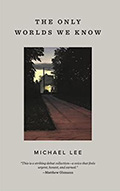
Michael Lee (BA 2015)
The Only Worlds We Know [poetry]
Button Poetry, 2020
From Rhino: "Michael Lee’s debut collection is a compelling study of pain, addiction, trauma, and perdition. Pills, pipes, gurneys, knives, doors, keys, houses, and snow; all swirl in couplets, erasures, tercets, and dramatic monologues, to form a collection that captures a Minnesotan sense of north and the loss of youth. Shaped by memory, delivered with craft, both images and narratives blend to produce a eulogistic rural nostalgia. In other words, a tribute to a free-range wildness under a wide clean sky that is now consumed through YouTube and surveillance cameras. Told in simple language, these reminiscent vignettes are not without shame and guilt over the casualties witnessed by the survivor. Survival creates hope. 'Let me preserve this documentation of ruin. / Some nights, I want to stay this way forever / I want to sing until the grass sews my mouth shut.' The collection is underscored by a faith in art and craft as healing. And yes, The Only Worlds We Know does translate well onto the page, which is not always the case for poetry-slam champions. . . . With craft and courage, Lee cracks the rock of memory, and his debut lets the light in. The collection is a guide, a map, a lantern—bright with lamentation."
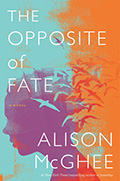
Alison McGhee (MA 1993)
The Opposite of Fate [fiction]
Mariner Books/Houghton Mifflin Harcourt, 2020
From Kirkus Reviews: "The reader learns two things about this novel’s protagonist at the outset. One is that Mallie Williams has been in a coma for months and months. The second is that she’s pregnant. From that arresting opening, the story jumps ahead to the moment when, a year and a half after having been raped and beaten, Mallie wakes. She struggles to deal with the knowledge that she has given birth to a child she would not have chosen to keep had she been capable of making decisions for herself. . . . McGhee handles this conflict with considerable care and without taking sides. But this is, at its heart, a novel about family—including chosen family—autonomy, and identity. Thoughtful and moving."
Ben Meyerson (MFA 2019)
An Ecology of the Void [chapbook]
Above/Ground Press, 2019
From the author: "This is a project that has always eluded any strict designation for me—it incorporates poems, smatterings of theory and philosophy, and even fragments that mirror the language one might encounter in a manifesto. My goal in the work was to explore the affect of a materialist or Spinozist politics and the directive for critical distance in the face of mounting environmental and social urgency."
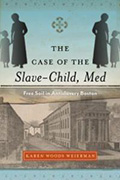
Karen Woods Weierman (PhD 1999)
The Case of the Slave-Child, Med: Free Soil in Antislavery Boston
University of Massachusetts Press, 2020
From the publisher: "In 1836, an enslaved six-year-old girl named Med was brought to Boston by a woman from New Orleans who claimed her as property. Learning of the girl’s arrival in the city, the Boston Female Anti-Slavery Society (BFASS) waged a legal fight to secure her freedom and affirm the free soil of Massachusetts. While Chief Justice Lemuel Shaw ruled quite narrowly in the case that enslaved people brought to Massachusetts could not be held against their will, Med was released to the care of a local institution. When she died two years later, celebration quickly turned to silence, and her story was soon forgotten. In this book, Karen Woods Weierman complicates Boston’s identity as the birthplace of abolition and the cradle of liberty, and restores Med to her rightful place in antislavery history by situating her story in the context of other writings on slavery, childhood, and the law."
